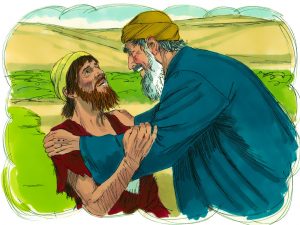Today, I ask you to think with me of two prodigal sons in the Bible – one unnamed, yet familiar, the other named Absalom.
These accounts had similar beginnings, but far different endings. Both sons went away from their fathers. Both sons had their own agendas and rebellious hearts. Both came to a point where they wanted to return to their fathers. Both returned and were received by their fathers with a kiss; yet, there the similarities end, because one returned with a heart of regret, the other with a heart of repentance. One returned saying, “…make me as one of thy hired servants..” (Lk. 15:19); the other returned and stole the hearts of his father’s servants (II Sam. 15:6).
The return of Absalom surely included some regrets for the consequences that sprang from his actions when he killed his brother and fled the country. He did not like the impact nor the implications of separation from his father, so he sought to come home and return to some semblance of normalcy, but we see by his future actions that his heart toward his father had not truly changed. He was not sorry for the sins that had caused the distance between them, only for the inconvenience that distance produced. His return was not motivated by any type of repentance, only by regret for the outcome his own actions had created.
The return of the other prodigal in Luke 15 is a much different story. We find him coming to the end of his own resources, to the emptiness his own choices had created, and there is no doubt that he had regret, but his regret moved him to repentance. He came to see himself and his own actions in a different light. His return was not only motivated by a desire to improve his own condition, but by a desire to take responsibility for his own decisions. He not only wanted food from his father’s table but a restoration of a relationship with his father, even if that relationship was in a different context.
He realized he would rather be a servant near his father than a son far away.
There is a difference in regret and repentance. All of us at some time have regret for the consequences of our sin. It is painful to us. It creates separation from our heavenly Father. But are we truly repentant? Do we see ourselves as a victim of circumstances, or do we acknowledge responsibility for our own actions? Would we go back and do the same, or worse, if we thought we could change the outcome (as Absalom sought to do), or are we willing to forsake our sin and change in our heart and our actions toward our Father?
Regret alone will never truly change us. It will never bring restoration and peace, but repentance will.
Regret continually looks backward, but repentance allows you to move forward.
Perhaps the difference between the two can be summarized in this poem:
Regret says, “Lord, please change the bitter taste of my sin’s fruits.”
Repentance says, “Lord, please change me, dig up sin’s bitter roots.”
Regret says, “Lord, I don’t deserve to reap what I have sown.”
Repentance says, “I don’t deserve one mercy You have shown.”
Regret says, “It’s not all my fault, this trouble I am in.”
Repentance says, “Against Thee and Thee only have I sinned.”
Regret says, “I’m sure hungry, And these swine eat more than I.
Repentance says, “I’ve been a fool, but I don’t have to die.”
Regret says, “I have nothing left, no money and no friends.”
Repentance says, “I’ll go and tell my Father I have sinned.”
Sin will lead you far astray, and no matter where you roam,
Regret laments the journey’s end, but repentance brings you home.
N.L.
© Copyright 2015 Niki Lott.
*Images used courtesy of Sweet Publishing/www.FreeBibleImages.org.




Such tremendous truths!